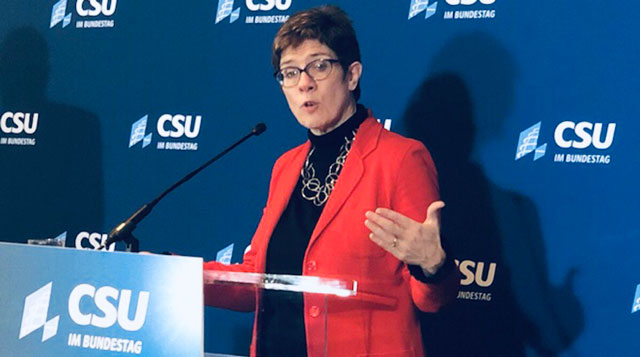
Berlin, Germany | AFP | Dismissed by some as a mini-Angela Merkel, the new leader of Germany’s centre-right CDU party and likely next chancellor has marked the turn of the year by underlining a change in tone from her mentor.
Annegret Kramp-Karrenbauer, known in Germany as AKK after her initials, raised eyebrows Tuesday when she said her party will hold a critical session on February 11 on Germany’s immigration policies.
“By reviewing the policies with regards to refugees since 2015, the new boss of the CDU shows that she’s not a younger version of Angela Merkel,” the Sueddeutsche Zeitung newspaper said.
“She is positioning herself clearly against Merkel”, whose decision in 2015 to keep Germany’s borders open to refugees has deeply divided the country.
AKK’s planned debate on the decision to let in more than a million asylum seekers was a way to openly contradict Merkel, who has always said debate about the past would amount to “frittering away” time.
“A month after her closely-run election, Kramp-Karrenbauer has started to orientate the CDU her way, setting its work programme,” wrote the Frankfurter Allgemeine Zeitung.
In a symbolic gesture suggesting a departure from Merkel’s years, AKK is also using a different office at the CDU’s headquarters from that of her predecessor.
Kramp-Karrenbauer, 56, was elevated to the “crown princess” position after Merkel tapped her to be the party’s number two as general secretary early last year.
Following Merkel’s announcement that she would not run for another term as CDU chair after 18 years in the job, Kramp-Karrenbauer won a party election in early December to take over the post.
Merkel has also said that she would step down as chancellor at the end of her mandate in 2021, meaning that the new chairwoman of the CDU stands a real chance of succeeding her as Germany’s leader.
Kramp-Karrenbauer’s win in December marked not only a victory for herself, but also one against an anti-Merkel rival, Friedrich Merz, who had championed a more conservative tone.
– ‘So much unity’ –
Her narrow win raised questions about whether she would be able to get Merz’s followers to fall in line.
Since then however, the markedly more conservative line pursued by AKK has repositioned the party on a slew of issues where Merkel’s critics had accused her of being too moderate.
Beyond migration, AKK on Sunday took an environmental NGO to task over its anti-diesel campaign and pledged that she would not endanger thousands of jobs in the automobile sector.
On social issues, she has raised the question of reexamining dual nationality for those with foreign origins.
The devout Catholic has for long said she was opposed to gay marriage.
With one fell swoop, she has not only placated Merz’s followers for now, but also introduced a detente with the Bavarian sister party Christian Social Union, which has for years been sniping at Merkel’s heels.
“There has not been so much unity in the Union in a long time,” noted national news agency DPA.
The strategy appeared to be paying off for now, with the CDU-CSU polling at just above 30 percent and holding the far-right at 14 percent.
A key test will come during European elections in May, followed by three state elections in the autumn in eastern Germany, a stronghold of the far-right.
Even if the CDU-CSU alliance were to hold its ground in the elections, poor scores for its junior coalition partner the Social Democrats (SPD) could prompt the centre-left party to quit the bloc.
And Kramp-Karrenbauer’s repositioning of the party towards more conservative policies could lead to clashes with the SPD, making life more difficult for Merkel.
The SPD, which is struggling in the polls, is already bristling at Kramp-Karrenbauer’s call to slash taxes.
 The Independent Uganda: You get the Truth we Pay the Price
The Independent Uganda: You get the Truth we Pay the Price





